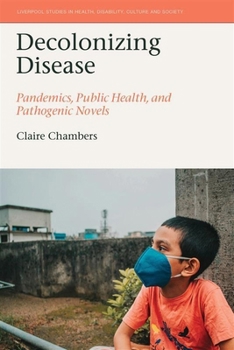Decolonizing Disease: Pandemics, Public Health, and Pathogenic Novels
Ebook available to libraries exclusively as part of the JSTOR Path to Open initiative.
Decolonizing Disease explores how pandemics both expose and entrench global inequalities. Tracing the environmental, racialized, and (neo)colonial dimensions of public health crises, Claire Chambers examines how pandemics from the 1918 flu to Ebola, HIV/AIDS, and Covid-19 have exacerbated social divisions rather than exerting a levelling effect.
The book interrogates the intersections of disease, the climate crisis, and political fault lines of race, class, and gender. Chambers creates a new framework for understanding 'pathogenic novels', fiction that resists colonial legacies while grappling with pandemic-era anxieties. The term carries dual connotations relating to the emergence of diseases and to innovative narrative forms responding to them.
Chambers brings together a compelling range of authors, from Phaswane Mpe to Hari Kunzru, to illuminate how literature has responded to past and present pandemics from twenty-first century perspectives. The writing confronts xenophobia, misinformation, and ecological collapse while envisioning alternative futures.
Decolonizing Disease argues that literature serves as both a critique and a remedy - offering insight, resistance, and the possibility of re-worlding in times of crisis. In an age of epidemiological neoliberalism and post-West global shifts, this urgent study stakes a claim for the role of fiction in challenging systemic injustices and imagining healthier and more equitable futures.





